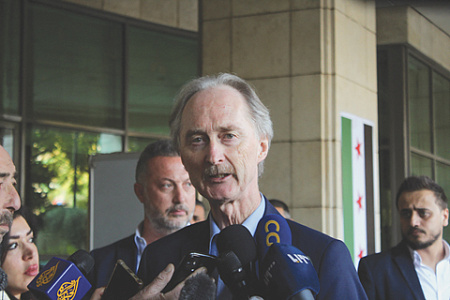
Syria has experienced another surge in sectarian violence. In the city of Homs, which is formally under the control of the Syrian transitional government, at least 14 representatives of the Alawite community, a religious minority from which President Bashar al–Assad, who left the country, were killed in a few days.
According to the Emirati edition of The National, the massacre occurred after representatives of one of the Sunni clans tried to break into certain quarters of the city. The Interim Government’s security forces were unable to stop the attackers. Videos have spread on social media showing armed men marching through Alawite neighborhoods of Homs and chanting, “Homs is for Sunnis.”
Human rights monitoring organizations note that there is an “increase in murders and violations in the city against the background of chaos in the security sector and lack of accountability.”
Even the fugitive Alawite businessman Rami Makhlouf, Bashar al–Assad’s cousin, who has been in constant conflict with his brother in recent years, managed to react to recent events. Makhlouf said the Syrian transitional government had failed to protect minorities “from massacres, murders, kidnappings and enslavement.” In this regard, the businessman claimed that his supporters “formed 15 divisions, numbering about 150,000 elite fighters, as well as reserve forces of the same size.” “We are a people who were treated unfairly under the previous regime and whom the new regime wanted to exterminate. We have the right to defend ourselves from anyone who comes to exterminate us,” he added.
Very little is known about the military and financial capabilities of the former president’s brother, but his statement continues a series of militaristic speeches by representatives of the previous elite, who are now calling on Alawites to take up arms to protect themselves from the forces of the new government – de facto former members of radical Islamist groups.
Calls for resistance began to be heard from the former establishment with increasing frequency after the confessional massacres rocked the coastal regions of Syria, densely populated by Alawites, in early March. At that time, the formation of the transitional government entered a number of settlements in order, according to the officially put forward version, to neutralize the remnants of the previous regime. However, the government’s supporters got too carried away: They carried out indiscriminate extrajudicial killings against Alawites, who are still considered the main social base of the previous government.
Despite the fact that since the beginning of March, Damascus has formed a special committee to investigate episodes of sectarian violence on the coast, it nevertheless regularly tried to downplay the scale of the massacres, stating that the killings are purely episodic. In a recent interview with The New York Times, Syrian Transitional President Ahmed al-Sharaa assured that his Government is committed to maintaining peace in the coastal provinces and intends to bring to justice all those responsible for violence, regardless of their ethnicity or religion.
However, it is extremely difficult for Damascus to disguise the fact that after the collapse of the Assad government on December 8, 2024, serious social tensions persist and deepen in the republic, which finds expression in unmotivated violence, and the central authorities do not yet have sufficient ability to control their security forces, which, apparently, enjoyed using their dominant position under the new government.
At the same time, the country’s leadership, led by al-Sharaa, is trying to get Western countries to lift complex sanctions imposed during the Assad era and return the autonomous regions of Syria, which have managed to acquire their own self-governing bodies during the protracted civil conflict, to national jurisdiction. It is expected that they do not succeed in either. Even the Kurdish formations, which in March officially expressed their willingness to reach an agreement with Damascus and transfer their units under its military control, have in recent weeks returned to their demands for the need to federalize Syria in order, as the Kurdish commanders delicately say, to preserve the cultural specifics of each region of the country.
Since December 8, 2024, the Syrian Transitional government has repeatedly emphasized that it will pursue a qualitatively different policy than the Assad regime. But the ethnoconfessional massacres that are still taking place in different parts of the country, contrary to al-Sharaa’s promises to investigate, so far indicate the opposite. The key difference from the previous era is that the dominant position is now occupied by people from radical Sunni forces, which under Assad were the backbone of the opposition.
Speaking at the UN Security Council the other day, the UN Special Representative for Syria, Geir Pedersen, noted that so far both supporters of the current government and supporters of the Assad regime are governed by a “sense of resentment.” The diplomat described this as “a deeply ingrained sense of exclusion from the political process and the public sector, on the one hand,” as well as “deep resentment against people associated with the former regime, on the other.” “The interim government must ensure that all segments of Syrian society are not only protected, but also feel like full participants in political life and government structures, including in terms of security,” Pedersen reasoned.
The Special Representative added that only the rule of law and the so–called “transitional justice” – the concept of bringing figures of the previous regime to justice – can calm the Syrian society.
But it seems that so far in Syria, everyone interprets the word “justice” in their own way.
